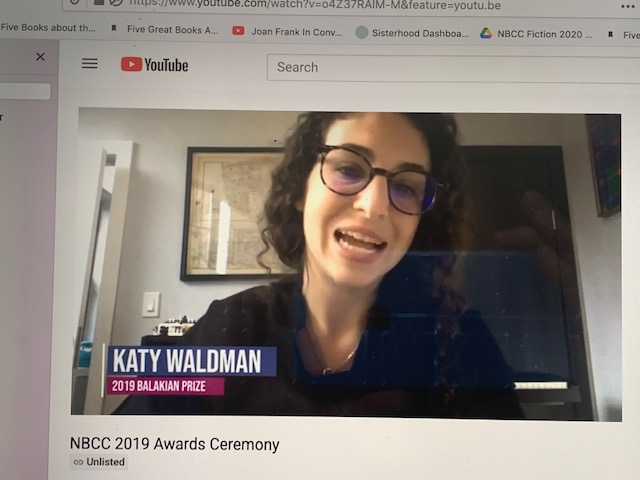
Thank you so much.
As you know, a favorite past-time for book people is giving speeches. That said, I did get myself pretty pumped to address you all last March. Here are a few lines from those remarks that are sadly funny now.
“I am truly honored to be up here tonight.”
“There is so much brilliance in this room.”
But I am truly honored to be here, wherever “here” is. I want to thank the board of the National Book Critics Circle and the members of the Balakian Committee. I’m deeply grateful to Gregg Barrios, who has been funding this award since 2012. The winners and finalists for last year’s prizes are a dazzling group; it’s an honor to share metaphorical space with them. I’m also grateful to my colleagues, past and present, for teaching me how to read and write. That statement, too, is metaphorical, but perhaps not as metaphorical as you think it is. And, of course, I want to thank my family for their love and support.
The saying goes that criticism can be either a mirror or a hammer. It can either reflect its subject—which means something deeper than just describing it—or it can evaluate it. In college, as an English student, I was trained in mirror criticism. That was for the best! Professors don’t care if a freshman thinks “Paradise Lost” is a minor poem. And mirror criticism can be powerful—done right, it separates a book into its component themes and emotions and then somehow reconstitutes those elements into a new, revealing shape. But, in the years since college, I’ve come around to a vision of criticism that is both mirror and hammer, or that is perhaps mirror and then hammer, or, failing that—because many of us have space constraints—I’ve come around to a new critical directive entirely, which is: focus on the most interesting thing. That doesn’t have the metaphorical power of the mirror or the hammer, I know. And sometimes a work’s goodness or badness is the most interesting thing about it. Other times, though, the most interesting thing is a complicated tone, or a surprising thesis, or a sense of self-consciousness about tradition. Books, like people, can take many paths to interesting.
As I was first writing this speech I was taken with the idea that “interest” comes from “inter” “est”—Latin for “it is between.” What’s “interesting,” then, is what’s up in the air, what’s unresolved. Of course, most texts that we read are resolved, in a sense; they’re already written. So how do we keep things interesting? This is where the collectivity and connectivity of language becomes so beautifully clear. Inter est. I hear an object after the preposition: “it is between us.” A speech is given to others. And a book review asks questions about the text between us: How does it work? What does it say?
In publishing, what authority looks like, how it expresses itself, is changing. I often feel as though I’m a serious writer in my work, whereas, on Twitter, my hoped-for brand is something like “happy dog who is secretly smart.” But a more significant piece of this is that those who weren’t always part of the official conversation are now able to be heard. Changes to the structure of publishing, changes very often driven and amplified by social media, mean that we all sometimes get to be authors, sometimes readers, sometimes commentators. The phrase “everyone’s a critic” used to be descriptive of human nature; now it’s simply descriptive of a technological fact.
This shift matters in part because it points a way forward, toward a culture in which diverse perspectives and diverse forms of authority are honored. And for those who are newly empowered to critique—people of color, women, other marginalized groups—there’s a lot of certainty to unravel. We are all holding mirrors, and hammers, and it’s within our power to both faithfully unpack the present and to rule on it, identify its shortcomings, propose alternatives. Critics need to be careful about distinguishing between their humble craft and the loftier aims of art, but I will say that this power—to reflect, to challenge—is one that poets, novelists, and nonfiction writers also share, and that no part of my critical practice is more rewarding than when I feel the boundaries between different types of writing soften and dissolve, so that what comes forward is the basic act of saying something, as clearly and authentically as you can, about what the world is and could be.

